|
|
| |
album
profile
The wheel turns full circle
Rahat Fateh Ali Khan comes into his own with Charkha
Charkha is not more than an album; it's a labour of love for all
involved to carry on the legacy of Nusrat Fateh Ali Khan
By Muniba
Kamal |
| |
|
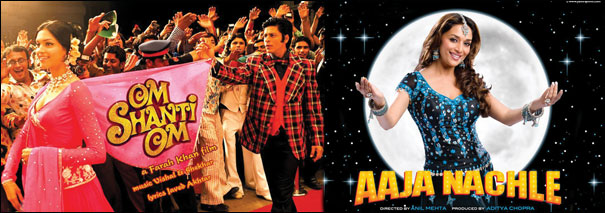
|
| |
Rahat
Fateh Ali Khan's Charkha is the most haunting record in the market
right now. Though the hype around it may not have built up because
of the subtlety of the record, but now it seems to have filtered in
and through and regularly features on the charts. It's been a slow
burner but on first listen one can tell that this is a record that
will burn long and gain strength. Charkha is classic in every sense
of the term.
The
videos on music channels all over, 'Tere Bina' and 'Kanday Uttay',
are only the tip of the ice berg here. Charkha is music to listen
to in solitude, preferably with dim lighting. The reworking of Bullay
Shah's 'Charkha' and Shah Hussain's 'Sainyaah' included, most songs
on the album are a reworking of the qawwalis in Nusrat Fateh Ali Khan's
repertoire. The only original compositions are 'Tere Bina', 'Na Janay
Kahan' and the unsurpassable 'Jiya Dhadak Dhadak Jaye' that became
a superhit in India in 2005 when Mahesh Bhatt used it for the film
Kalyug. Already a star in India after 'Mann Ki Lagan', 'Jiya Dhadak
Dhadak Jaye' ensured that Rahat become a voice in demand across the
border; beyond the realm of the Bhatt family.
He
sang 'Naina' for Vishal Bharadwaj's critically acclaimed Omkara (2006),
'Main Jahan Rahoon' for the surprise blockbuster Namastey London (2007)
, 'Bol Na Halke Halke' for Yashraj Films Jhoom Barabar Jhoom (2007)
, 'Jag Soona Soona Lage' for the Shahrukh Khan magnum opus Om Shanti
Om (2007) and the haunting 'O Re Piya' for Madhuri's come back film
Aaja Nachle (2007). Yet it is Charkha, Rahat Fateh Ali Khan's solo
album that is truly satisfying listening for the qawwali aficionado
as well as for those who like trippy lounge music of the sort that
Thievery Corporation and Buddha Bar records have made so popular amongst
the party crowd looking to chill out to sounds that carry on from
where the DJ leaves off.
|
| |
|
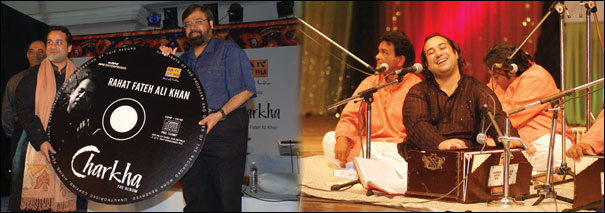
|
| |
|
The
sound of Charkha
Carefully constructed by Rohail Hyatt, Charkha is a sonic delight.
The visual landscape reminds one of a desert in bloom. The musicality
is sparse but tasteful (barring the remixes of 'Charkha' and 'Tere
Bin', that gradually race thumping into a manic assaulting beat,
but more on those later). The album opens with the sublime 'Charkha',
that reworking one of the immortal kalams of Bulleh Shah, that puts
a whole new spin on the phrase 'the wheel keeps on turning'. With
the twang of a guitar occassionally interjecting the more consistent
percussion that seems to be modelled on the clapping that traditionally
accompanies a qawwali performance, Rahat's vocals build up to the
chant 'Aaja Har Charkhe De Gheray Main Tainoon Yaad Kardi'. The
sound is modern and yet familiar because the form of qawwali is
not interfered with and that has been Rohail Hyatt's aim throughout
the album.
"You can't
mess with the form," Rohail resolutely maintained when he set
out to do Charkha years ago.
Rohail seems to have learned how Westerners worked with Rahat's illustrious
uncle Nusrat Fateh Ali Khan. There was Peter Gabriel's 'Mast Qalander'
remix that burnt dance floor all over the world, but which remained
an aberration for the true followers of qawwali and then there was
Michael Brooks' interpretation of the Nusrat first in Mustt Mustt
and then more noticeably in the super sublime album Night Songs that
will never lose it's incredible replay value. Qawwali is music that
you sink yourself into and let it seep in; even as electronica can
make it more accessible to the modern world it is important that qawwali
retain its essence, which is spiritual to the extent that it caused
musician Jeff Buckley to famously comment "Nusrat is my Elvis". |
| |
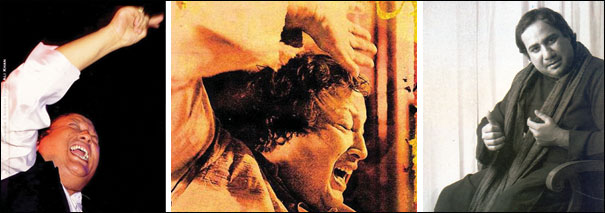 |
| |
And
this is precisely what Charkha does. It elevates Rahat to a whole
new iconic level. Rohail Hyatt has played acoustic guitars, percussion
and done the programming for most of the songs. Assad Ahmed has played
electric guitars on the album. Abbas Premjee also comes in for a song.
Rahat's troupe is employed for another. But essentially Charkha is
all about Rahat Fateh Ali Khan and his craft. It focuses on the qawwal
and his qawwalis and being so true to what it sets out to be is the
album's greatest strength.
After the mindblowing title track, the album launches into the mesmerizing
'More Ang Ang Baje', it's followed by the sonorous 'Rang Rangeela'
and then there is 'Tere Bina' which speaks of the sweet pain of parting
with a beat that quickens as suspense gathers. On the album it is
the song that launches the searing intensity of the next three songs
that grab you by the jugular.
'Kanday
Uttay' is the only song that employs Rahat's humnawa, who contribute
backing vocals on this track; Ballu Bhai from the famed Tafu Brothers
of Lahore is responsible for percussions and Dildar who performed
with Nusrat and then Rahat was roped in to lend tablas to the track.
'Kanday Uttay' is a scorcher. It is nothing like what you will hear
when you watch the glammed up Indian-directed video, unless you close
your eyes.
|
| |
This
is followed by 'Dunga Pani' with lyrics by Rahat Fateh Ali Khan that
is a slow slash your wrists and die melody that takes you to the cavernous
depths of inner despair of the worst kind. And this is followed by
'Aj Hun' that begins with haunting classical guitars that can only
be done by Abbas Premjee coupled with the rat-a-tat done by Rohail
that sounds suspiciously like a matka. 'Aj Hun' is somber song that
picks up as Rahat Fateh Ali Khan picks up with his melodic Sa Re Ga
Ma, racing through the notes before taking the lyrics to a brighter,
happier, uplifting place.
After
the intensity of the 'Kanday Uttay', 'Dunga Pani' and 'Aj Hun', Na
Janay Kahan is a breath of fresh air. It was originally composed by
Rahat's father Farrukh Fateh Ali Khan. It's a song as opposed to a
qawwali, but when you have Rahat singing, it's a perfect example of
how a trained vocalist can lift a ballad.
|
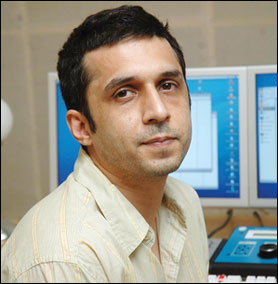 |
| |
Then
come the remixes of 'Tere Bin' and 'Charkha'. Boy would one love to
hear them playing at a rave and one is sure that they will. Without
the irritating jhankar beats that keep Indian remixes from being truly
enjoyable, these are a lesson in how Eastern music can be uplifted
by electronica to suit the dance floor without being reduced to being
perfect soundtracks to the sleazy clubs typified in the Indian film
Chandni Bar.
Sandwiched between the two remixes is Shah Hussain's 'Saiyaan' that
is electrified to a thrilling intensity but without ever overshadowing
Rahat's voice or getting in way of the lyrics that tell of love and
longing so great that one would give it all up for the 'Saiyaan'.
The album fittingly ends with 'Jiya Dhadak Dhadak Jaye', which we
have already heard and been entranced by since 2005. It belongs more
in this album Charkha than it did in that film Kalyug. The irony is
that had 'Jiya Dhadak Dhadak Jaye' not been given to that film, one
doubts that a project as ambitious and pure as Charkha would have
seen the light of day in Pakistan.
The making of Charkha
Charkha is a project that started many years ago. With Rahat being
based in Faisalabad and Rohail Hyatt in Karachi it was a difficult
undertaking. Faisal Rafi was the crucial bridge between Rohail and
Rahat shuttling between Karachi and Faisalabad as and when necessary.
With a deep abiding love for Sufi music, Faisal Rafi went full throttle
into the working with Rahat while at Sajjad Panjwani's Visible Changes.
Since he had done the last few shows with Nusrat before his demise,
Sajjad had put him onto a project with Rahat which he worked on with
Shahi Hasan. This is when Rahat was known as Nusrat's nephew and skeptics
believed that with his squeaky voice, he would never be able to live
up to the towering legacy of his uncle. Rahat proved the naysayers
wrong with 'Mann Ki Lagan', produced by Shahi Hasan and Faisal Rafi.
Used by Pooja Bhatt in her super flop film Paap, the song went on
to become a superhit. Rahat had proved himself in Bollywood and only
greater things would come.
It was after the success of Paap in 2003 that Saregama showed an interest
in Rahat Fateh Ali Khan's music and the deal for Charkha was made.
A few weeks after Rahat's return to Pakistan, his father who had not
been keeping too well passed away. As it works in gharanas, Rahat
became the head of the clan and was out of musical action for a year.
By the mid–2004, Faisal Rafi wanted to set the project rolling,
but Shahi was busy, so it he took it to Rohail Hyatt to produce. |
| |
Rohail
Hyatt outdid anything Rahat had done with the standout track 'Jiya
Dhadak Dhadak Jaye'. Years in the making, Charkha could find no takers
in Pakistan. It was 2005 and Rahat Fateh Ali Khan's star had yet to
rise in Bollywood and credible music labels had yet to come out in
Pakistan. Who would be interested in a classically trained singer
who had no chance of becoming the heart throb of millions and thus
help push colas, ice cream cones and mobile phones into the market
via his endoresement? The answer is no one.
And so the strategy was strike India, where the tradition |
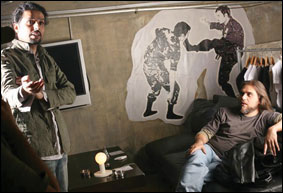 |
| of
trained playback singers ensures that classical ustads have merit.
Mahesh Bhatt, who had shown an interest in the music was given 'Jiya
Dhadak Dhadak Jaye' to use in Kalyug. The song was an immediate hit
when it came out. Saregama became even more interested in Rahat's
solo album and Rohail and Faisal took it upon themselves to deliver
the goods. |
| |
|
There were songs that had to be rewritten and simplified. Like the
second track that opens with the words 'Mohe Ang Ang Baje Madhur
Bansuri, Torey Yaadon Ki Chhaiyyaan Taley', which is adapted from
the Sufic song that goes 'Moray Makhdoom Bajay Madhur Bansuri Teray
Gullar Ki Chhaiyaan Taley'. Makhdoom was a saint in India and the
song describes him playing the flute under the shade of the gullar
tree.
Ahmed Anis, a childhood friend of Rahat's has adapted the lyrics
to make them more listener friendly for a greater audience.
"The qawwalis are in so many dialects that the average listener
wouldn't be able to understand them. We changed the lyrics to make
them more accessible," Faisal Rafi tells Instep. "But
there was also the respect factor. Hazrat Makhdoom was a saint,
and the minute you put out an album in India, chances are the videos
will feature semi-clad women dancing to the songs. We didn't want
to disrespect Sufi saints."
Yet, Faisal is quick to pint out: "Anis Ahmed redid the lyrics,
but the soul is the same. 'Makhdoom' is replaced with 'Ang Ang'
and 'Gullar 'with 'Yaad'. The substitute is true to what Sufis sing
about."
It's an intelligent logic and one that Rohail Hyatt and Faisal Rafi
applied while going about remaking and rewriting with Rahat and
his team. These ancient qawwalis that are truly the songs of the
soil. And there is something about them that gets people whether
they understand the language or not. Eddie Vedder came under the
magic of Nusrat's craft, as did Jeff Buckley, Peter Gabriel and
Michael Brooks and countless others. Charkha puts Rahat Fateh Ali
Khan on the plain that Michael Brooks put Nusrat Fateh Ali Khan
on with Night Songs. Charkha is world music that the people anywhere
in the world would respond... as they did with Nusrat. And it is
the perfect launch for Rahat at a time when he has shed the slightly
shrill nervous voice to sing from the heart (and the stomach at
times) as his uncle had foreseen he would.
The significance of Charkha
At Rohail Hyatt's Coke Studio recently, it was Rahat's performance
that was the most riveting out of all the artists. He's acquired
the same quality Nusrat had of hypnotizing you with the power of
his voice and the control he exerts over it. Rahat can make his
voice ring out to the heavens and take it down to the soothing effect
of falling rain. And like any classical musician, he will only get
better with time.
Success has come also much easier to Rahat than it did for his uncle.
While Nusrat broke out into the West and the world at large rather
late in life, he was touching 50, Rahat has made it much younger
and with India under his belt, he is perfectly poised to take on
the mission his uncle began.
"Many have said I have compromised my faith by coming to the
West. But this is not so. To travel the world and open the hearts
of those whose were previously closed is a joy worth the other sacrifices,"
said Nusrat in an interview to Andy Carvin while he was alive. It
was a man speaking about the opposition to his openness towards
collaborating with Westerners within the classical music gharanas
of Pakistan. Yet Nusrat reached out to the world because he realised
that like all things, qawwali too must evolve.
As Pakistan, with the rise of media and a young population, becomes
a different place in sync with the rest of the world, it is imperative
that qawwali change tack and reach out to both the younger audience
and the world at large. This is what Charkha does for Rahat Fateh
Ali Khan and it is important that he carry on this path even as
he chases those Bollywood hits that can make a Pakistani musicians'
career these days.
One doubts that Rohail Hyatt's production of Charkha can have rivals
amongst Bollywood music composers (the only person one can discount
is AR Rahman) who are very good at making filmi songs. The problem
with Rahat's Bollywood foray has been that the songs he has sung
there employ him as a fine singer and are pleasing to the ear, but
they lose the intensity of his art which is qawwali. Nusrat also
fell into this trap when he did songs like 'Afreen Afreen' with
tacky instrumentation that did no justice to his craft. And then
there were also gems like 'Piya Re'. And ironically, the best Rahat
Fateh Ali Khan song after 'Jiya Dhadak Dhadak Jaye' has been 'O
Re Piya' from the film Aaja Nachle; the rest have been hack jobs.
With Charkha, Rahat Fateh Ali Khan gets a brilliant showcase, in
front of which his forays into Bollywood fall short. One hopes that
there is a sequel to this album and that it is put together as thoughtfully
and tastefully as Charkha.
|
| |
|

